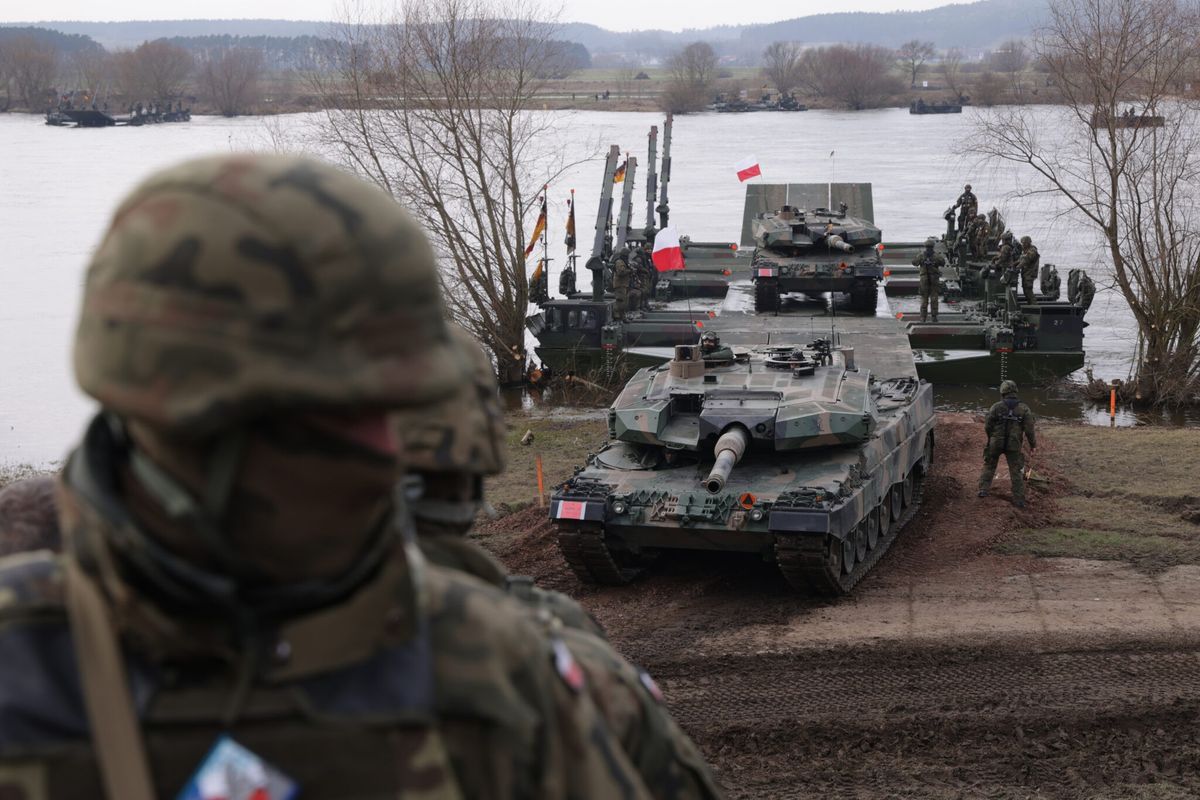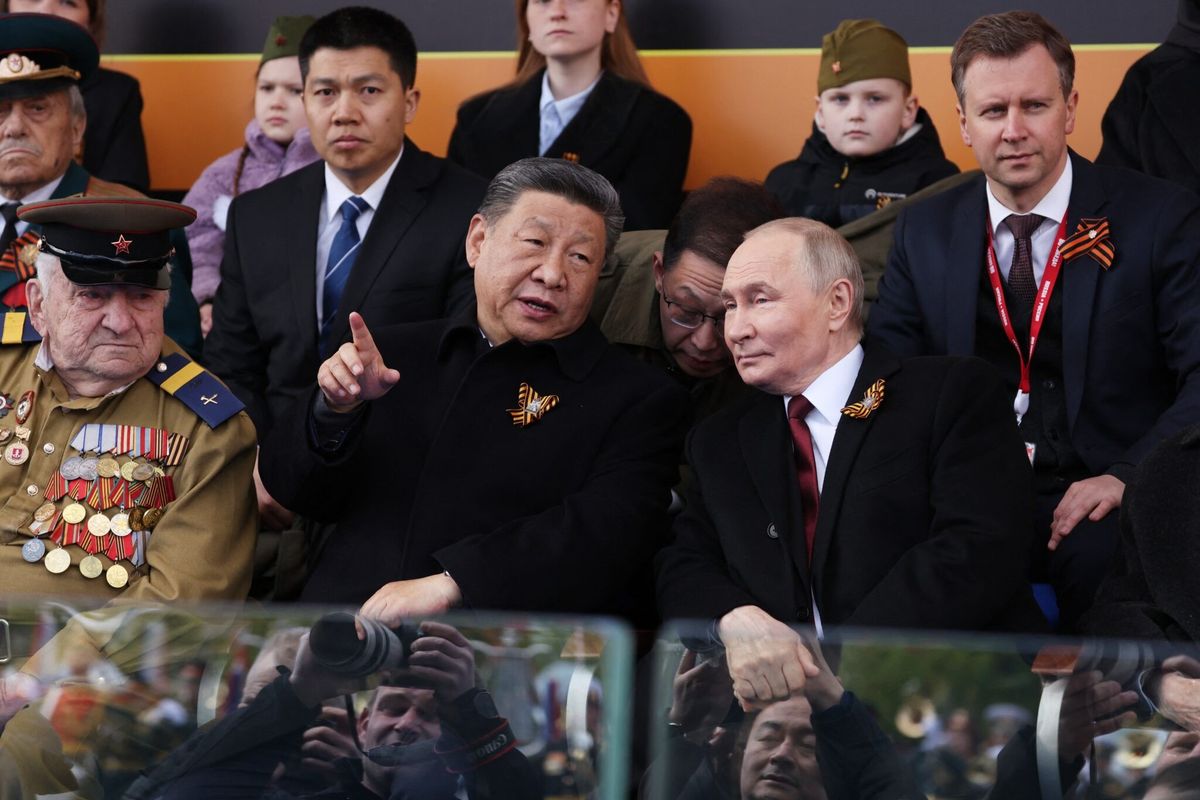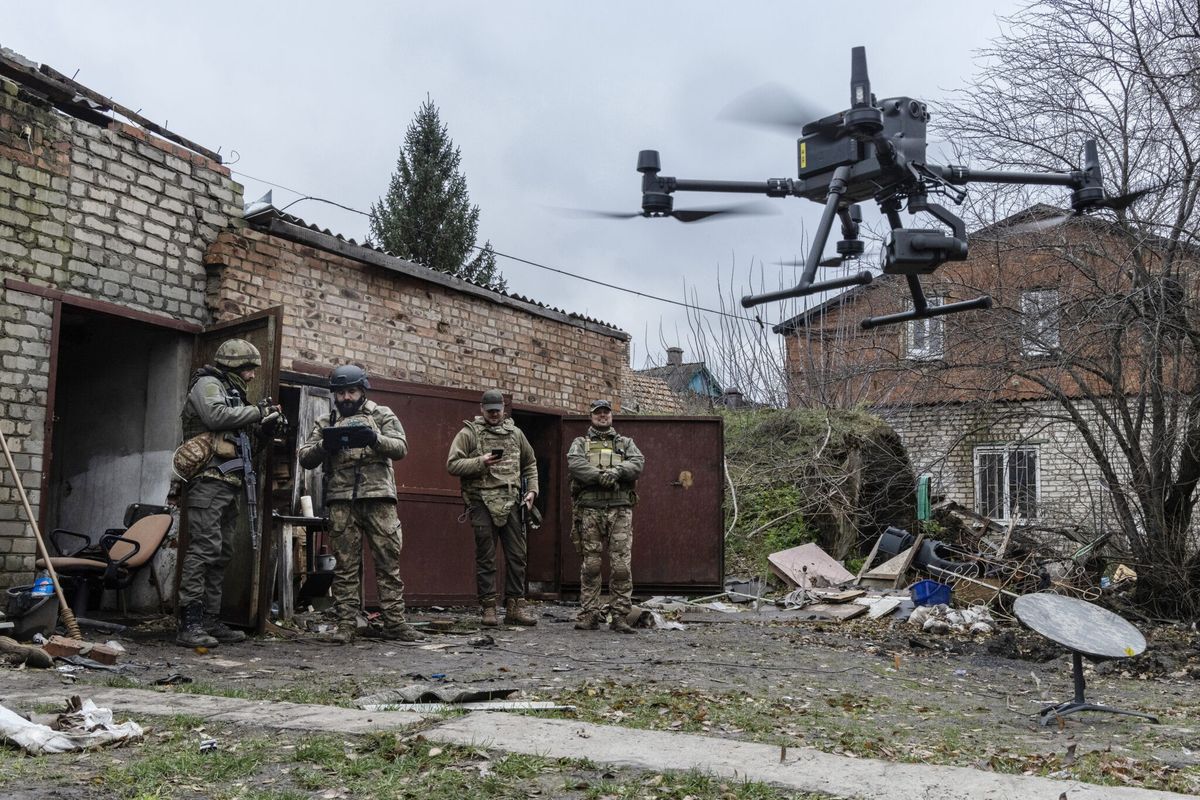SUBSCRIBER+ EXCLUSIVE INTERVIEWS - Two years ago, Russian President Vladimir Putin ordered his armed forces to attack Ukraine. Putin called it a “Special Military Operation,” and by several accounts he anticipated a swift victory and was surprised by the tenacity of the Ukrainian resistance and unified response of the NATO alliance.
One year ago, at the one-year mark of the war, Ukraine could count several battlefield achievements: a successful defense of the capital, Kyiv, in the early days of the war; late-2022 routs of the Russians in Kharkhiv and Kherson; huge rates of Russian casualties; and a robust blend of financial, military and political support from the U.S. and Europe.
The two-year mark of Russia's illegal invasion is a far more sober occasion for Ukraine. The frontline momentum has shifted, the recent Russian victory at Avdiivka has raised fears of further setbacks, and the hugely impactful supply chain of American military aid is threatened by fraying support in the U.S. Congress.
In the week leading up to this anniversary, The Cipher Brief spoke to a dozen experts about the state of the war, two years on - people from the military, intelligence, diplomatic and media sectors, all with high-level experience and expertise when it comes to Ukraine and the conflict with Russia. Some chose to focus on the battlefields and frontlines of the moment; others on the Washington debate over aid; still others took the long view in offering suggestions for the year ahead.
We list their answers here - in alphabetical order.
General Philip Breedlove (Ret.)
Cipher Brief expert and former NATO Supreme Allied Commander (from CNN)
Ukraine is going to end exactly how Western policymakers want it to end. We will determine how this goes, because if we give Ukraine what they need they will be able to take care of the Russians. They've done it strategically three times already in this war: north of Kyiv (in March 2022), north and northwest of Kharkiv (September 2022), and operationally, to some degree, in the South. So, we just have to understand that Western policymakers will absolutely determine how this ends.
And what we're seeing now is the public faltering of support is affecting the soldier on the battlefield. When you're in that frontline border trench, or you're in a ditch or wherever, and you are wondering whether the West still has your back, it's going to affect the way that you decide the actions that you take, and you have to begin to prepare for not getting that support, even if we all believe it's gonna happen eventually. They have to assume they may not, and they'll start changing plans based on the assumption that the west will not continue support.
Evelyn Farkas
Executive Director, The McCain Institute
The most urgent needs for the Ukrainians, some of them are things we can’t handle, meaning manpower, fresh troops. But what we can provide is military assistance.
We need to provide Ukraine with more and longer-range artillery. We need to make sure they can continue doing what they’ve been doing in and around the Black Sea, basically opening up a corridor of transit of trade. If they have longer-range missiles, they can take out the Kerch Strait Bridge. That’s the famous bridge that Putin built that provides the resupply into Crimea from Russia.
They can use the weapons to take out other infrastructure, to continue the sabotage operations on Russian military sites inside of Russia proper. So, there are things that the Ukrainians can do to continue to get the Russians off balance and to erode their capabilities.
The Ukrainians are doing the best they can to manufacture equipment. And I think if American and European companies went in there, because that has nothing to do with the U.S. government, they can go in there and offer the Ukrainians some technical know-how and work with them to jointly produce, if that’s the quickest way to do it. But the Ukrainians have been very resourceful, and they are already working on building their own defense industry.
In addition to that, the Europeans could step into the breach and use some of the money that they approved to buy weaponry and provide that weaponry to Ukraine. They could buy it from us. We are somewhat limited by our industrial base and the ability to manufacture fast enough, but these things are surmountable if we put ourselves on a war footing.
And then the last part is in terms of resources, we really should be looking at the ($280 billion in) Russian frozen assets and figuring out how we can employ some of them to help the Ukrainians. If that money is used for reconstruction, which is probably the most appropriate use, then the European funds that were earmarked for reconstruction can be repurposed for military support.
Nick Fishwick
Cipher Brief expert and former Senior Member, British Foreign Office
The problem is that European powers have been too passive and risk-averse in responding to Russian actions. Of course they deserve credit for the support they have given Ukraine, but the strategy, as much as there has been one, has been to try and help the Ukrainians edge the Russian invaders eastwards. Now it looks as if that strategy may be failing. Further support may not be forthcoming, as the U.S. fails to get funding through Congress, and the Ukrainian effort starts to atrophy.
This does not mean that Europe must or can give up. Poland and the Baltic States remind us of that. We cannot reward Putin’s aggression and violations of international laws and norms. We have no reason to think that, if he paused fighting over “a deal” now, he would not start fighting again when it suited him. If he is to be stopped, the fight has to be taken to Russia.
When Europeans are inspired by the message that Russia has to be stopped if what we love and believe in is not to be destroyed, and that this is how we will do it, no amount of Kremlin-funded propaganda and disinformation will deter them. To quote Polish prime minister Donald Tusk, after a recent meeting with President Zelensky in Kyiv, “It is here, in Ukraine, that the world front between good and evil runs.”
Gen. Ben Hodges (Ret.)
Former Commander, U.S. Army Europe
Neither side can knock out the other at this point. Russia knows that their only real hope is for the West to completely quit on Ukraine, and so they’ll continue to feed unlucky Russian soldiers into the meat grinder and try to convey that they can do this forever. But they can’t. For the Ukrainians, they’ll use this year to stabilize the front, fix their personnel system, build up their own defense industry.
The West must get organized, harness and repurpose the enormous economic advantage we have over Russia, and isolate Russia from support from Iran and North Korea and China.
Ukraine can defeat Russian mass with long-range precision weapons that will destroy Russian headquarters, Russian logistics, and Russian artillery. Every square meter of Russian-occupied Ukraine is within range of US ATACMS (army tactical missile systems) and German Taurus (air-launched cruise missiles). Europe must reprioritize all the ammunition it is already producing for Ukraine. Currently over 50% of what is made in EU countries leaves Europe and goes to customers in the Middle East and Africa.
Ukraine must fix its personnel system. Ukraine has over 2 million women and men of military age. But the system is not designed to recruit and attract them. If they were confident that they’d be properly trained and equipped and put into good units before being sent into combat, and if they were sure that the government would take care of their families if something happened to them, then the many thousands of Ukrainian women and men of military age would flock to the armed forces. This is the job of the government - which means tough political decisions by Kyiv.
We will still be talking about this in February 2025. But the conversation could and should be much better if the U.S. and the EU commit to Ukraine winning. Russia is in a desperate economic situation and I don’t think what they are doing now is endlessly sustainable - if we ensure the sanctions are tough and tightened and our governments are committed to Ukraine winning.
Natalie Jaresko
Former Finance Minister of Ukraine
Most critical for Ukraine, of course, is security, which requires focus on technological innovations, air defense, and military supplies.
Second is economic sustainability. Economic sustainability requires a focus of effort and partnership in several areas.
Ukraine’s economic recovery requires a priority focus on the return and reintegration of the over 6 million Ukrainians living abroad and 5 million internally displaced persons to their homes, and support for our veterans, who have given so much to our country. To achieve this, Ukraine needs partner support to continue to invest in housing, education, and employment.
Economic sustainability also requires investment in restoration and strengthening of the infrastructure that ensures both life and work – the water pipeline, for example, required because of Russian destruction of the Kakhovka dam this past summer.
Finally, prioritization and investment in increasing export potential and supporting the local private sector are critical for Ukraine’s economic sustainability. Priorities are seaports, rail connections, EU border crossings and working capital and financing availability for Ukraine’s private sector.
Gen. Jack Keane (Ret.)
Cipher Brief expert and former Vice Chief of Staff, U.S. Army (from Fox News)
What did we learn in 2023? The Ukrainians tried to do a big operation, a major counteroffensive, to defeat Russia and take the South and then force them out of Crimea. And when we look back on that, we made some serious mistakes here.
One, we handcuffed them by not giving them all the equipment needed when they needed it. And they needed a lot of specialized equipment to get through the Russian obstacles.
The second thing is, we asked them to fight US-NATO doctrine against the Russians when they're not ready for that. And we should have really recognized what are their strengths, and not try to force them into what our strengths are. And if they're going to get a redo of this, and hopefully they will, they'll fight this very differently in dealing with the Russians, maximizing their capabilities.
If given the weapons when they need them in this coming year, the Ukrainians do have the opportunity to take back territory. Not in a big operation to win everything, but in much smaller, decentralized operations that play to their advantages and expose Russia's vulnerabilities and weaknesses.
Stanislav Kucher
Former Russian TV presenter, Editor-in-Chief of the Samizdat online anti-censorship platform
The deeper and further into the war, the more confident Putin feels. Reprisals against dissidents have exceeded the scale of Brezhnev's and Khrushchev's times. It's now obvious that hardliners in Putin's entourage have prevailed.
By killing Alexei Navalny, Putin has sent a clear message to the West that "paddling back" in any sense is not an option he considers. He will take his confrontation with the West to the limit; to him, "it's either them or us", and any peace negotiations with Ukraine will be only on his terms.
Two years after the invasion, Putin is feeling as safe as ever. His political opponents or those who could pose a potential threat have been either killed (Yevgeny Prigozhin, Navalny) or thrown to jail (Igor Strelkov). More than a million Russians have fled the country. There is no imminent domestic danger in sight.
As for the West, Putin is confident that the U.S. has shown its weakness and is no longer ready to support Ukraine.
So today Putin believes he has every reason to feel and behave as, if not the winner, then at least someone who's taken over the initiative and is now running the show.
As to the atmosphere in Russia, it can be best described by a message I received via Facebook messenger from an old friend in Moscow, a top manager at one of Russia's strongest private banks.
"Stas, thank you very much for your Facebook posts about Navalny! I'm sorry I can't click the "like" button and show my attitude in public...They promised to fire me last time I liked your post. I've only heard about Stalinist times from my grandmother, but now I feel like I understand what it was like from my own experience.”
Gen. David Petraeus (Ret.)
Cipher Brief expert and former director, Central Intelligence Agency
The big question now is, when will the assistance be coming from the United States? We’ve had reassurances from members of Congress who are here (at the Munich Security Conference). But of course, there’s no set date and there’s a real concern that Ukraine could begin to run out of air defense interceptors or artillery.
The Europeans have come through. The European Union just approved 50 billion euros in additional funding that takes them well over the two (dollars) to every one U.S. dollar that already has been provided. European countries individually have each been doing a great deal as well.
There’s no illusion that Russia would stop in Ukraine. There’s keen awareness that Vladimir Putin would go on to Moldova and Lithuania, and others in the Baltic States. So, there is a seriousness of purpose that is very palpable. But it does come back to the big question hanging over all of this, which is about U.S. support.
Russia does have the strategic initiative at least on the ground. But of course, keep in mind Ukraine’s achievements in the Black Sea. Their maritime drones have forced the Russians to withdraw from the important port of Sevastopol in occupied Crimea for the first time in a couple of centuries. They’ve made it possible for their ships to get grain out through the Western Black Sea from which they’ve pushed the bulk of the Black Sea fleet, having destroyed at least one third of the ships of that fleet.
That’s a very significant achievement. We do sometimes overlook that, but it doesn’t in any way assuage concerns about what’s going on there on the ground, where once again, continued U.S. support is absolutely critical.
Admiral Mike Rogers (Ret.)
Former Director, National Security Agency
Can Ukraine count on the West, the EU, the United States, NATO and other nations? Can Ukraine count on continued financial, military and political support from the rest of the world as it executes its fight on the ground and in the air against the forces of Russia that have illegally invaded their nation?
(At the Munich Security Conference), there were lots of questions as well about when this war will end and how. What’s the mechanism to end it? Does it end, or does this become a long-term standing conflict, or a frozen conflict? Some people like to use the analogy of, “Well, does this become a situation like South and North Korea?” where quite frankly, we have an armistice, but we have never formally ended that conflict, and we have the most heavily fortified border in the world with literally a million troops on either side. Does that play out in Ukraine? I certainly hope not.
There’s a realization in Europe that industrial capacity, both for many of the traditional commodities associated with national security, certainly the commodities like artillery, mortars, ammunition, et cetera, grenades, that these are challenges that are really proving to be a limiting factor right now in the battlefield in Ukraine.
Adm. James Stavridis (Ret.)
Cipher Brief expert and former NATO Supreme Allied Commander (from Bloomberg)
This is a dangerous moment, and not just for Ukraine. If the US walks away — as it did from Europe and Asia in the 1930s — authoritarian powers will fill the void. And we would likely end up, as we did in 1941, embroiled in a conflict on a far larger scale.
Yes, any reset must include changes by the Ukrainian military command and new technologies. But unless a real effort is made to restore the truthful narrative — that Ukraine’s fate is tied to Americans’ own, and the best mechanism we have to win is NATO — there is real danger ahead. Zelensky can’t do this by himself. It will require leadership in Washington from both sides of the aisle.
Ambassador Kurt Volker
Cipher Brief expert and former U.S. Ambassador to NATO
There remains a lot of concern about what’s happening in the United States and the inability of the House of Representatives to get the aid bill for Ukraine to the floor, and some of the comments from Donald Trump about NATO have really alarmed some people.
The Europeans are talking about creating greater investment funds for the defense industry so that they can guarantee procurement, which will allow industry to invest in order to ramp up European defense production. That’s a positive step right there. There’s also talk in the next European Commission that they might create a commissioner for defense, which would be a first for the European Union, and that would be someone at a senior level who would oversee these kinds of investments.
And many NATO countries are already ramping up defense spending. Poland, for example, is already spending 4% of GDP on defense this year. Lithuania is doing the same thing. And compared to 2016, when just three NATO allies were spending 2% or more of GDP on defense, now that number is 18. So, things are trending in the right way in terms of Europe improving its own capabilities.
I think that there is a resolve here in Europe, maybe even more so in the United States right now, that they know they’re going to have a long-term standoff with Russia because of the nature of the regime.
Read more expert-driven national security insights, perspective and analysis in The Cipher Brief













